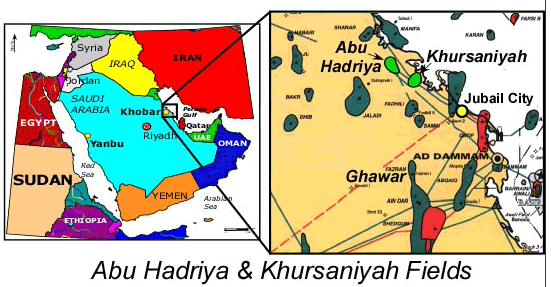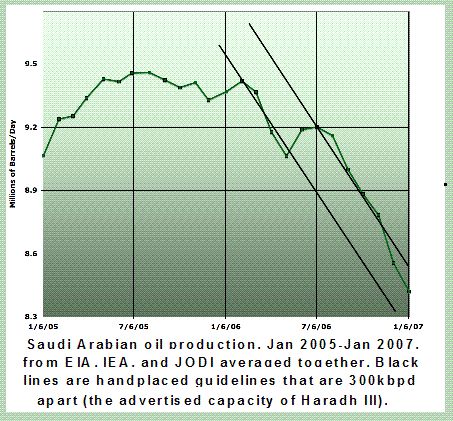Chang-Tai Hsieh and Enrico Moretti, of the University of California, Berkeley,......Sourced here.
As they point out, Iraqi oil, such as Basra Light, is a close substitute for Arabian Light.
Refiners in India, China, South Korea, Taiwan and Japan see Basrah Light as a good alternative to Asia’s mainstay imports such as Saudi Arabia’s Arab Light
Sourced here
Additionally there is a wonderful graphic on page 5 of the pdf found here .
I then thought, what would prevent the KSA from piping Iraqi crude to its own refineries for domestic use, and can I find anything on the web concerning the IPSA. The IPSA appeared to be closed according to a number of sources, including the US State Dept, and the US Energy Information Administration. The State Dept presentation is dated January 25th, 2006 and it seems to contradict a number of other sources dated earlier that suggest the KSA portion of the IPSA was converted to Natural gas. What I do find strange is the exact same sentence is found at different websites. This of course infers a single source in the viral sense of the internet, though I was not able to track down what I thought might be the initial source.
Sources: the EIA, Senator Lugar's website, and World News Network.
In June 2003, Thamir Ghadban said that he hoped Iraq would be able to use the IPSA line again. However, the Saudis have stated that they are not willing to do this, having converted the line to carry natural gas to the Red Sea industrial city of Yanbu for domestic use.
Only Gerald Butt @ Alexander's, could be quoted differently
Much of Saudi Arabia's natural gas production seems to come from the eastern part of the country, the offshore fields in the Persian Gulf and the NG associated with the Ghawar oil field.
Saudi Arabia has said the section of the pipeline within the kingdom is now being used to transport natural gas and has ruled out its re-use as a crude conduit from Iraq.

The IPSA pipeline was intended to be a way for Iraq to export oil via the Red Sea port of Mu'ajiz, near Yanbu, during the Iraqi Iranian War. Yandu & is a major industrial city utilizing NG for energy. Considering the Saudi push to expand domestic NG production and use, it seems to make sense KSA would use the IPSA to move NG west to the Red Sea. Except that the IPSA doesn't appear to be the route of choice. If the IPSA is being used for NG, it could be fed from the Trans Arabian/Jordon pipeline, though a connection bewteen the 2 would have to have been built.
In Oct of 2002 Saudi Arabia did complete a $4billion natural gas processing plant at Hawiyah, near the middle of the 164 mile long Ghawar oil field. In 2004 a natural gas processing plant was opened near Haradh, the southern tip of the Ghawar oil field. Natural gas production from these plants can free up significant quantities of crude for export.
In conclusion its not at all clear in my mind if the IPSA is being used, or what its being used for. With Iraqi oil production still below pre war levels one could argue that Iraqi oil is being pumped by the Bush Cheney faction in Iraq, to Saudi Arabia, for domestic use. As a favor to the Saudi's. On the other hand the Saudi effort to use NG domestically to free up crude for export could be argued as a model that fits into the assumed management scheme in the KSA, in light of declining crude reserves.
But why let an asset such as a pipeline sit unused for so long? I would offer that the IPSA is being used. Whether for stealing Iraqi crude, or to move the increased Saudi natural gas production, the IPSA is most likely being used.
EDIT: to include graph of KSA oil production

Note the increased oil production in the summer of '05. The Spike in the summer of '06 is new production coming online from the Haradh oil field. More important is the current overall trend of KSA production being in at least 8% decline.





8 comments:
I see where you're coming from with this. Back when Air America was on WLIB, I remember Randi Rhodes talking incessantly about the Arab roots of 9/11 and global terrorism. If they were pulling the strings to get the US to secure those oil fields via the invasion, and siphon off crude in the meantime, that would give them a tremendous advantage in setting international energy policy. First, there would be an artificial shortage that would drive up prices, while the Saudi's enjoyed a secret surplus, which means they could sell more black gold. On top of that, they shut down money that should be going to Iraq.
Interesting hypothesis, as good as any other, I suppose.
I had a friend in oil who knows much more about this than I. Maybe I can get in touch with him. I'd like to know why a pipeline would be shut down, other than for repairs. I'd also be curious to know what else could be shipped via a pipeline.
This might be a good thing to follow up on, although finding out stuff from the US might be difficult. A spike in Saudi oil production, perhaps? A population decrease or increase in the towns along the pipeline (i.e. people not being able to work, or actually finding work, or maintaining the status quo--and if the last, how?).
Yup. Pretty interesting all right.
KSA porduction spike in summer of '05
http://i38.photobucket.com/albums/e101/FogerRox/SAproduction05to07.gif
Well, I will edit the dairy to include the picture
Post a Comment